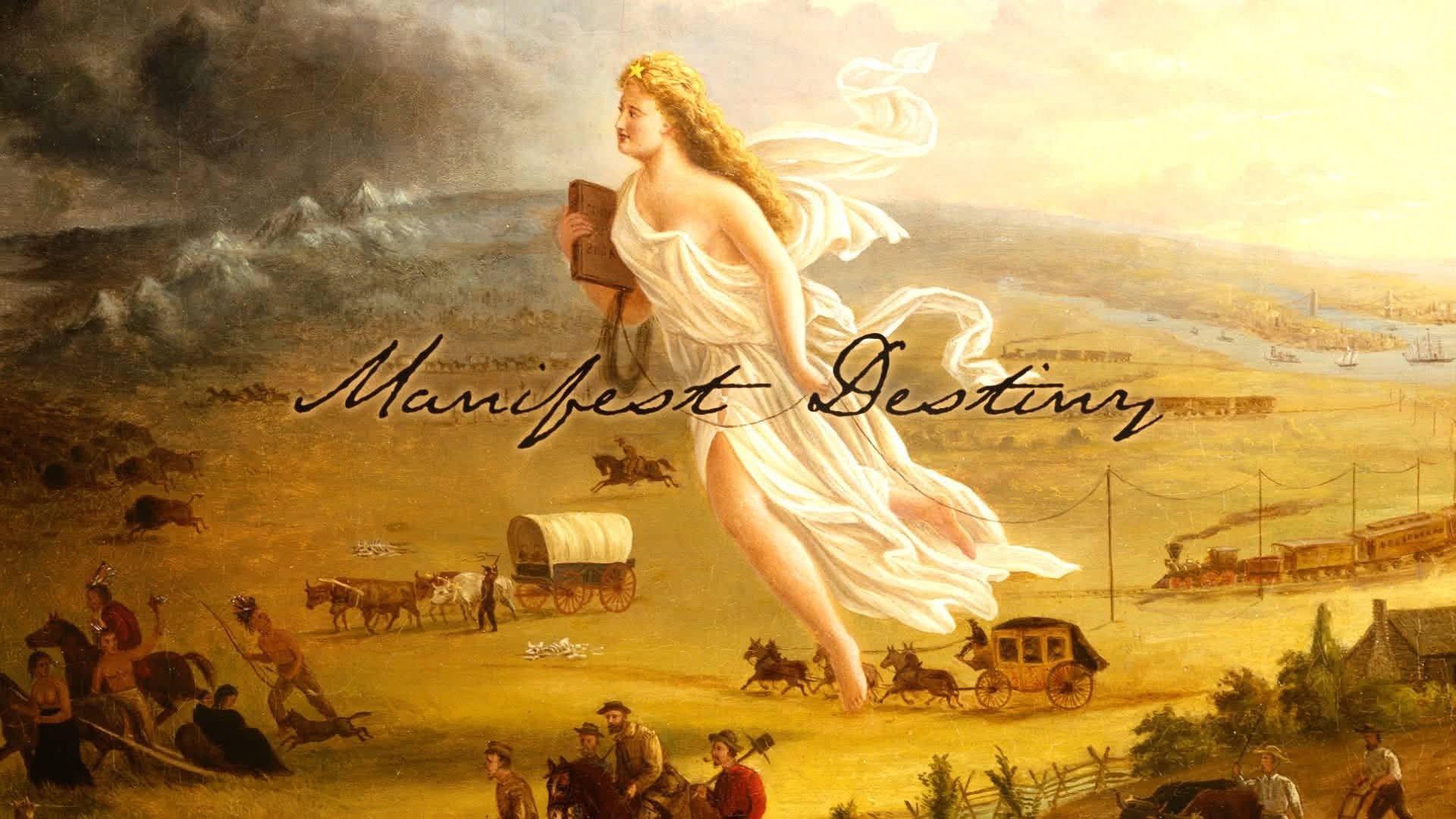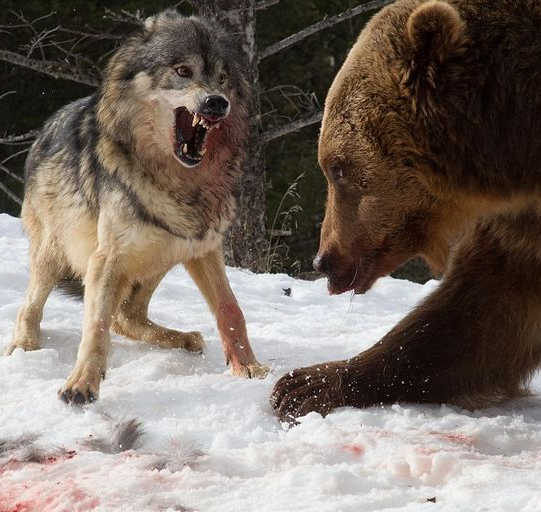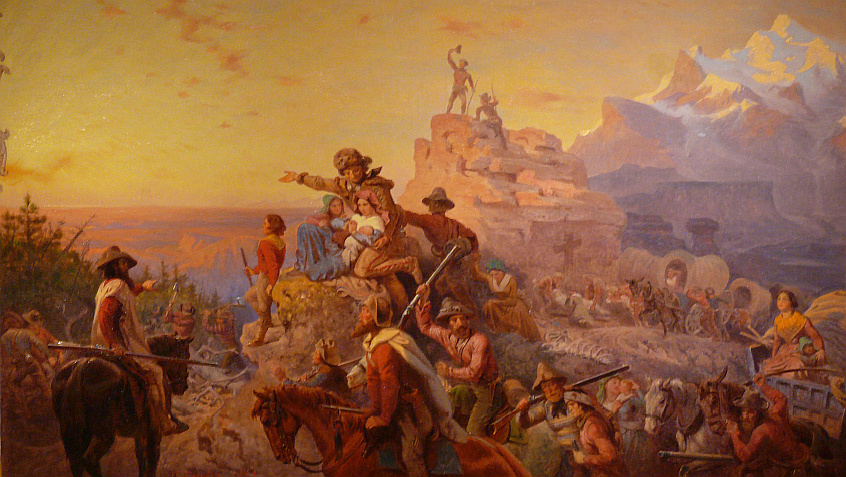From Nature’s Eternal Religion, by Ben Klassen
Book II – Chapter 9

Even the most backward savage is well aware of the essential importance of land, room and territory within which his tribe can live and survive. So essential and self-evident is this idea that they will fight and risk their lives in order to either preserve their own, or expand and take over the adjoining tribe’s territory.
Even before the White Man ever arrived on the shores of America, the hundreds of Indian tribes constantly fought each other. And what were they fighting for? They were fighting for land, room and territory within which their tribe could hunt and live, could pitch their teepees, and their offspring could prosper and expand.
This urge and this knowledge are so basic and instinctive that even the birds and animals are well aware of this basic fact of Nature. In many cases they too stake out their territory. They know that you can only glean so much sustenance from a certain area of land and they mean to stake it out and protect it.

In an earlier chapter we noted how the majestic eagle staked out his territory, lived within it and worked it diligently. We also observed the wisdom of the wolf family, in the same chapter, of how they stake out their required territory and how they refresh their boundary markers almost weekly. We also saw how other wolf families, too, had their territory and respected adjoining boundaries. They each had the instinctive wisdom to realize that land and territory were basic to their existence. They worked it and they guarded it. Property rights and territory were evidently a serious matter between the wolf families and well organized.
In the cat family, mountain lions will do the same thing. They know they need so much territory to live in and they will stake out their territory and claim it as their own to hunt and provide sustenance for the rearing of their family. Certain types of monkeys not only organize their territory but organize the hierarchy of their tribe. ...
Read More
[According to Disneyland] In the Arctic areas, the lemming, a prolific rodent, on the other hand, has a different solution to the problem. In order to keep the population in line with the territory and the land area available, and to keep this area from becoming overcrowded, they will, every so many years, lead a mass suicidal trek to the ocean and drown by the hundreds of thousands.
The point I am making here is that land and territory are synonymous with population, whether it be animal, bird or human population. Land and territory are basically essential, not only for providing sustenance, but also providing living room. One square mile of land can only provide so much food and fiber for a limited number of people. There are still some people who will deny this, arguing that with increased technology we can go on forever in providing an ever increasing production and that there are no limits in sight. This just isn’t true. Not only is there a definite limit to the productivity of the soil regardless of how much technology is involved, but as the population increases, more and more productive land is taken out of production and utilized for home building, cities, living space, highways, roads, canals, right-of-ways, etc. Witness, for instance, the productive orange groves that only 30 years ago existed in Southern California. Now they are practically all gone, all that vast acreage being, by and large, covered with residential subdivisions.
Not only that, but the human population will expand fastest in those areas where there is plenty of room. Empty spaces seem to invite the rearing of larger families. Witness, for instance, the early pioneers in the west. Wherever land spaces were wide open and sparsely settled, the White pioneer had large families. In contrast, city dwellers, especially in apartment housing and areas of heavy density, have relatively small families among the White people. In fact, our best racial stock comes from the rural sections, although many of these sturdy peasants might migrate into the cities later and make their claim to fame and fortune in the cities. Looking at it from the point of view of whole countries, we find, for instance, countries like Scotland and Ireland, where space is limited; the fertility is curtailed as well. We find that Ireland has a population of about 4-1/2 million and Scotland a population of approximately five million. With the cramped land area available to them these population figures have changed very little over the last 100 years and there are even periods when the population declines. Contrast this for instance, with the number of people of Irish or Scottish descent in America and we find that although they have lived in the new world a relatively short time, racially speaking, yet there are now many times as many Irish and Scottish kinsmen living in America as there are now living in the country of their origin. This all goes to substantiate the fact of Nature that in order for a race of people to survive they need space, room and territory. In other words they need land. It is an overriding fact that there is only so much usable land in this world and there won’t be any more. It is also an ominous fact that the population of the world is increasing by leaps and bounds, and overwhelmingly it is the colored races that are increasing. This is due to the help and aid White technology has given the colored races and due to the fact that the Jew is plundering the White Man and taking food and substance from him and shifting it to the benefit of the colored races. The fact that the Jewish propaganda agencies label this as being philanthropic and humanitarian is beside the point. It is no such thing. It is a criminal act of plunder designed to expand the colored races and shrink the White Race. It does not take any great imagination to project the results into the future.

Unless the White Race wakes up shortly and begins to take its destiny in its own hands, it is going to be crowded into a smaller and smaller living space on the face of this globe. When the White Man has been weakened to the point where the colored races can then finish him off by force, the Jew, having inflamed the colored races with hatred, will then give the signal for the destruction of the remnants of the White Race. Let us make no mistake about it – the land area of this world and its resources are strictly limited and the time is coming very soon when either the White Race will organize to inhabit the earth, or it will be crowded from off its face by the inferior colored races. Since there is not now, and there never will be, room enough for both the White Race and the colored races to both perpetuate their own kind on the surface of this earth, I, for one, would much sooner that we survived than they. I am sure no member of the White Race wants to be crowded and finally slaughtered, and thus become extinct. If this happens, it will be because we were just too kind, or better, too stupid to fight for our survival. No, Nature has not created the White Race as its highest and finest accomplishment only to have them destroyed and crowded off the face of the earth by an inferior colored mass. Nor has Nature designated any particular portions of the earth such as Africa for the colored races, or the Negroes, or anybody else. The laws of Nature themselves dictate, and the experience of history shows clearly, that land and territory belongs to those that have the will, determination and strength to conquer it, to populate it, and then hold it in defiance of all would-be intruders.
It is a sad reflection on the lack of astuteness on the part of the White Man, or better, on the treacherous cunning of the Jew, who has been in control of world history for the last few thousand years, that the White Man is now crowded densely into a smaller section of the world while the colored races and mulattos occupy the vast majority of the best real estate on the face of the earth. For instance, Africa which is one of the wealthiest landmasses on the face of the earth, is overwhelmingly populated by the black man. The United States, a relatively new country, has a population density 2.3 times as great as that of the continent of Africa. Or compare the highly gifted and energetic German people who are now crowded into a land area smaller than Texas, whereas the backward Mongolian tribes of East Asia and the Slavic Tribes of Europe and Russia occupy vast areas dozens of times the size of Germany. Or take the British people, now crowded in their small island kingdom, bereft of their colonies, even after winning two World Wars. Then, to add insult to injury, the Jews, not only having stripped the great British Empire, are now deliberately shipping hordes of coloreds into the British Kingdom itself, injecting a foul pollution where no pollution had ever existed before. Yes, our right to the land and territory of the world is the holiest right the White Race possesses. Nature has not only endowed the White Man with the right to possess the real estate of the world but Nature has also endowed the White Man with the intelligence, the energy and the strength with which to exercise that right. It would be a dastardly shame and a dereliction of duty on our part if we fail to realize this, and fail by default to perform our obligation which Nature has clearly pointed out to us. If we fail to do this because we lack the common sense and the courage, we would be committing a most grievous crime against ourselves and our own future generations.
But, some bleeding heart will interject, when you propose such a course, aren’t you abandoning civilization and returning to the law of the jungle? To which I reply, no, my dear friend, we are not abandoning civilization. On the contrary, by expanding the White Race and shrinking the colored races we are proceeding on the most certain path for the preservation of civilization. You must remember that it is only the White Race that has created every civilization that has ever existed and when that race in its time and era became mongrelized and died out, civilization died with it. But in any case, we are not nearly as interested in preserving civilization, as such, as we are in preserving and insuring the future for our own kind and for our own race. This is the first, the foremost, and the highest Law of Nature and we would be derelict, when we have the wherewithal to do so, if we would neglect to fulfill the role that Nature and Destiny has ordained for us. It is most deplorable that these same bleeding hearts who scream to high heaven about the rights and preservation of the Negroes and other scum, seem blandly indifferent about the fate of the White Race. They remain totally disinterested when reminded of the fact that in our own generation, the Russians, under the direction of the Jews, drove nine million Germans from their homeland in Prussia and Eastern Germany, a territory that they had occupied for the last several thousand years. Nor does it greatly disturb them when they are reminded of the historical fact that the Jews during and after the Russian Revolution murdered something like 20 million While Russians, the cream of the intelligentsia and the original creators of art, civilization, industry and enlightenment in the Russian Empire. Nor are these same bleeding hearts greatly disturbed when they are reminded of the recent historical atrocity when the Jews drove 1.5 million Arabs from their farms and their homes and drove them out in the desert, drove them from land that they had occupied for the last two thousand years. This the Jews did without the slightest shred of legality, having no other claim than their lying religious concoctions. They then proceeded to pollute the minds of the White Race to such an extent that the majority of the White people, who should know better, supported them and helped them to commit this historic atrocity.
A cold, hard look at present day facts and figures should leave no doubt in our minds that the White Race is on a collision course with disaster. Not only are the mulattos and the coloreds rapidly out breeding us (thanks to our generous subsidies of food, technology and medicine) but we are rapidly running out of land and vital resources. The population of the world is multiplying with increasing rapidity. In 1650 the population numbered approximately half a billion. At that time it was increasing only at the rate of approximately 0.3 percent a year. At that rate it would take 250 years to double. It has, however, been increasing the rate of growth per year ever since. In 1970 the rate of growth had increased to 2.1 percent a year, a rate of increase seven times as great as it was in 1650. The world population now exceededs 7 billion people, overwhelmingly colored. In 60 years, at this rate, there will be four times as many people crowding the face of the earth as there are today. Would anyone care to predict their color? Now let us consider the land resources available, including arable land, fresh water, metals, forests and fuels. At most, there are available on the face of the earth 7.86 billion acres of arable land, recent studies indicate. Approximately half of this land, that is, the richest and most accessible half, is under cultivation today. The other half is marginal land, and will require immense investments of capital input to reach, to clear, irrigate and fertilize before it can produce any food. According to a recent U.N. Food and Agricultural Organization (F.A.O.) report, opening this marginal land to cultivation is not economically feasible, even given the pressing need for food in the world today. This despite the fact that much of the world today is already starving and undernourished. If only the present world population were fed by the prevailing U.S. standards, we would need 225 percent as much land as is presently cultivated, land that does not exist.

Where will the food come from to feed the hungry hordes of the year 2020? The answer is that there will be famine and political upheaval, with the strongest fighting for survival. It will be a racial war, and unless the White Race is psychologically prepared to defend its own by force of arms it will be engulfed and overrun. Not only are we running out of land, we are even more rapidly running out of the raw materials that have built and fueled our increasing technology. The consumption of our vital, non-renewable resources, such as copper, iron, oil, petroleum, aluminum, lead, silver, mercury, etc., is exponentially increasing even faster than the population explosion. Whereas the population is at present increasing at a rate of 2.1 percent a year, the increased consumption of aluminum is increasing at 6.4 percent a year, copper 4.6 percent a year, petroleum 2.9 percent a year. At this rate, it has been calculated that all the known reserves of aluminum will be exhausted in 31 years, copper in 21 years, and petroleum in 20 years. Whereas we may discover more new deposits, nevertheless, like the arable land, they are limited. Like the good land, new finds are harder and harder to come by, more and more costly to mine, and in any case, strictly limited. Whereas the above, due to limitation of space, is of necessity, only an incomplete and sketchy analysis of land and raw material resources available on this globe, it nevertheless fairly accurately presents the whole picture – and the implications are overwhelmingly clear : there is neither the land, nor are the raw materials available to sustain the present population explosion for another generation, not even for another 15 years. Something has to give.
The question screams to high heaven : who is going to survive? The White Race, who has created the present high level of technology, or the colored, the mulattos and the scum? With the Jew in control of the governments and nerve centers of the world; goading the colored and the Negroes to turn on the Whites : spurring them on to multiply even faster; burdening the White Man with more and more parasites on his back, we have reached a highly explosive end of the line. Yet the White Man seems completely oblivious of the danger he is in, nor does he seem to realize that he is the victim designated for destruction. The White Race acts as if it were drugged and helpless. It remains unorganized and impotent to lift a finger in its own defense. The lessons from the foregoing are overwhelmingly urgent. They are clear and simple. We must drastically change our whole outlook regarding our role in this world. No longer can we pursue the suicidal role of being the sweet charitable Santa Claus to the colored scum of the world. No longer dare we promote the multiplication of the inferior colored of the world, all of which hate us with a burning passion. No, we must be done with such self-destructive idiocy. The White people must take up a new creed and a diametrically opposite policy. We must rally to preserve our own. We must become intensely race conscious, and unite. We must organize. United and organized we are ten times more powerful than the Jews, Negroes and coloreds combined. We must save our race. We must learn from the above that there is just not enough land for natural resources for the White Race and the colored scum to both survive. We must learn the lessons of history that our White pioneers taught us in the eighteenth and nineteenth centuries : to drive the inferior coloreds before us and possess the good earth.
I believe in the spirit of White pioneering. Nature has tapped us on the shoulder and pointed the rest of the way. It is now our overwhelming obligation to proceed. Like our pioneering forefathers, it is our holy duty to acquire for ourselves and our future White generations all the good land and resources of this, our planet earth. The fundamental testament of Creativity in this respect for all time is clear and simple : shrink the colored races, expand the White Race, until we populate all the worthwhile lands of this Planet Earth in its entirety. There is no alternative.

